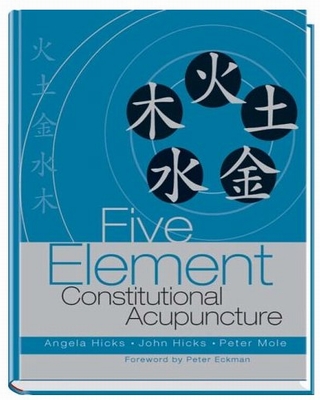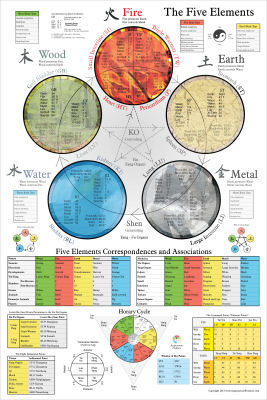Acupuncture and TCM Books
Five Element Constitutional Acupuncture
 Five Element Constitutional Acupuncture
Five Element Constitutional Acupuncture
Check New and Used Prices
by Angela Hicks, John Hicks, Peter Mole
Description
This exciting new textbook gives a clear, detailed, and accessible presentation of the main features of constitutional five element acupuncture treatment. It covers the context and history of this form of acupuncture, as well as the relevant Chinese medicine theory. After examining the elements themselves, and the functions of the Organs, the book explores the basis of diagnosis in five element acupuncture, possible blocks to treatment, and the treatment itself. It puts this style of treatment into the context of other styles of acupuncture treatment — especially Traditional Chinese Medicine (TCM) as it is used in the West today.
Key Features
- A clear and authoritative exploration of five element constitutional acupuncture.
- An description of the principle aspects of diagnosis within this system, ironing out inconsistencies often present in discussions of these aspects.
- An inspirational encapsulation of a popular style and approach in acupuncture, of interest to all schools of thought in Oriental medicine.
New to this Edition
- Overall revisions keep the material in this book up-to-date.
- New information on calculation of sample size and effect size features material of increasing importance in the field.
- Updating of all references keep the reader current with the latest real-world work in the field.
- Additional student activities within the text offer the reader even more help in learning new material or brushing up on the latest.
- New appendix features an exceptional critique of a published research paper.
- Two-color format makes the text visually appealing.
TABLE OF CONTENTS:
Section One: THE FOUNDATIONS
1. The Philosophical Foundations of Five Element Acupuncture 2. Five Element Theory 3. The Importance of the Spirit 4. The Constitutional Factor 5. The Causes of Disease
Section Two: THE ELEMENTS AND ORGANS
6. The Inner Development of the Practitioner 7. Introduction to the Five Elements 8. Wood Element – Key Resonances 9. Wood – The Organs 10. Wood Constitutional Factors 11. Fire – Key Resonances 12. Fire – Key Organs 13. Fire Constitutional Factors 14. Earth Key Resonances 15. Earth – The Organs 16. Earth Constitutional Factors 17. Metal Key Resonances 18. Metal – The Organs 19. Metal Constitutional Factors 20. Water – The Organs 21. Water Constitutional Factors 22. Some Common Confusions Between Different CFs
Section Three: DIAGNOSIS
23. Diagnosis – Purpose and Process 24. Diagnosis – The Key Methods 25. The Body Language of Different CFs 26. Levels and Golden Keys 27. Diagnosis by Touch 28. The Five Element Blacks to Treatment 29. Aggressive Energy 30. Possession 31. Husband-Wife 32. Entry-Exit Blocks
Section Four: TREATMENT TECHNIQUES
33. Needle Technique 34. The Use of Moxibustion
Section Five: THE USE OF POINTS
35. The Use of Acupuncture Points in Five Element Constitutional Acupuncture 36. Using Points to Treat the Spirit 37. Lung and Large Intestine points 38. Stomach and Spleen points 39. Heart and Small Intestine points 40. Bladder and Kidney points 41. Pericardium and Triple Burner points 42. Gall Bladder and Liver points 43. Ren and Du points
Section Six: TREATMENT
44. Treatment Planning 45. Treatment – Pulling it Together Section Seven: INTEGRATION 46. Integration with TCM – A Brief Introduction to How a Practitioner Can Integrate the Two Styles 47.
Case Histories Illustrating Integrated Diagnosis and Treatment
APPENDICES
Appendix A Different Terms to Describe the Spirit
Appendix B External and Miscellaneous Causes of Disease
Appendix C Four Needle Technique
Appendix D Blocks from Scars
Appendix E Treatment Reactions
Appendix F Checklist for a Traditional Diagnosis
Appendix G Outcomes for Treatment
Glossary
Bibliography
Five Element Constitutional Acupuncture
Check New and Used Prices
Five Elements Acupuncture Poster 24" X 36"
Shows the controling and generating cycle of the five elements along with several tables of associations and point references.